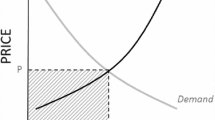Abstract
The significant theoretical objections that have been raised against memetics have not received adequate defense, even though there is ongoing empirical research in this field. In this paper I identify the key objections to memetics as a viable explanatory tool in studies of cultural evolution. I attempt to defuse these objections by arguing that they fail to show the absence of replication, high-fidelity copying, or lineages in the cultural domain. I further respond to meme critics by arguing that, despite competing explanations of cultural evolution, memetics has unique explanatory power. This is largely founded upon the increasing likelihood of formulating a workable fitness measure for memes, a memetic index. I conclude that memes must be integrated with psychological bias and population-dynamic approaches to cultural evolution.
Similar content being viewed by others
References
Atran S (2001) The trouble with memes: Inference versus imitation in cultural evolution. Human Nature 12: 351–381.
Aunger R (2002) The Electric Meme: A New Theory of How We Think and Communicate. New York: Simon and Schuster.
Aunger R (2007) Memes. In: The Oxford Handbook of Evolutionary Psychology (Dunbar R, Barrett L, eds), 599–604. Oxford: Oxford University Press.
Blackmore S (1999) The Meme Machine. Oxford: Oxford University Press.
Blackmore S (2000) The memes’ eye view. In: Darwinizing Culture (Aunger R, ed), 25–42. Oxford: Oxford University Press.
Blackmore S (2001) Evolution and memes: The human brain as a selective imitation device. Cybernetics and Systems 32: 225–255.
Castelfranchi C (2001) Towards a cognitive memetics: Socio-cognitive mechanisms for memes selection and spreading. Journal of Memetics— Evolutionary Models of Information Transmission 5. http://jom-emit.cfpm.org/2005/vol5/castelfranchi_b.html.
Cavalli-Sforza LL, Feldman MW (1981) Cultural Transmission and Evolution. Princeton: Princeton University Press.
Chielens K, Heylighen F (2005) Operationalization of meme selection criteria: Methodologies to empirically test memetic predictions. Proceedings of the Joint Symposium on Socially Inspired Computing, 14–20. Hatfield: The Society for the Study of Artificial Intelligence and the Simulation of Behaviour, University of Hertfordshire.
Dawkins R ([1976] 1989) The Selfish Gene, 2nd ed. Oxford: Oxford University Press.
Dennett DC (1991) Real patterns. Journal of Philosophy 88: 27–51.
Dennett DC (1995) Darwin’s Dangerous Idea. London: Penguin.
Dennett DC (2005) From typo to thinko: When evolution graduated to semantic norms. In: Evolution and Culture (Levinson SC, Jaisson P, eds), 133–145. Cambridge, MA: MIT Press.
Edmonds B (2005) The revealed poverty of the gene-meme analogy: Why memetics per se has failed to produce substantive results. Journal of Memetics—Evolutionary Models of Information Transmission 9. http://jom-ermt.cfpm.org/2005/vol9/edmonds_b.html.
Hale-Evans R (1995) Memetics: A systems metabiology. Working Report. http://ron.ludism.org/memetics.html.
Gil-White F (2005) Common misunderstandings of memes (and genes): The promise and the limits of the genetic analogy to cultural transmission processes. In: Perspectives on Imitation (Hurley S, Chater N, eds), 317–338. Cambridge, MA: MIT Press.
Godfrey-Smith P (2000) The replicator in retrospect. Biology and Philosophy 15: 403–423.
Godfrey-Smith P (2009) Darwinian Populations and Natural Selection. Oxford: Oxford University Press.
Henrich J, Boyd R (2002) On modeling cognition and culture: Why cultural evolution does not require the replication of representations. Journal of Cognition and Culture 2: 87–112.
Heylighen F (1998) What makes a meme successful? Selection criteria for cultural evolution. Proceedings of the 16th International Congress on Cybernetics, 418–423. Namur, Belgium: Association Internationale de Cybernetique.
Heylighen F, Chielens K (2009) Evolution of culture, memetics. In: Encyclopedia of Complexity and System Science (Meyers R, ed). New York: Springer.
Lewontin RC (1980) Adaptation. Scientific American 239(3): 156–169.
Lysett S, Cramon-Taubadel N (2008) Acheulean variability and hominin dispersals: A model-bound approach. Journal of Archaeological Science 35: 553–562.
Montague R (2006) Why Choose This Book: How We Make Decisions. New York: Dutton.
Nowak MA (2006) Evolutionary Dynamics: Exploring the Equations of Life. Cambridge, MA: Harvard University Press.
Nowak MA, Sigmund K (2004) Evolutionary dynamics of biological games. Science 303:793–799.
Pagel M, Krakauer D (1996) Prions and the new molecular phenetics. Trends in Ecology and Evolution 11: 487–188.
Pagel M, Krakauer D (1997). Reply to Edmunds & Yool: Is the propagation of prion molecules in different hosts an example of Lamarckian inheritance? Trends in Ecology and Evolution 12: 194.
Richerson PJ, Boyd R (2005) Not by Genes Alone: How Culture Transformed Human Evolution. Chicago: University of Chicago Press.
Ridley M (2000) Mendel’s Demon: Gene Justice and the Complexity of Life. London: Weidenfeld and Nicolson.
Sperber D (1996) Explaining Culture: A Naturalistic Approach. Oxford: Blackwell.
Sperber D (2000) An objection to the memetic approach to culture. In: Darwinizing Culture (Aunger R, ed), 163–174. Oxford: Oxford University Press.
Sterelny K (2006) Memes revisited. British Journal for the Philosophy of Science 57: 145–165.
Sterelny K (forthcoming) The Fate of the Third Chimpanzee. The Jean Nicod Lectures 2008.
Temkin I, Eldredge N (2007) Phylogenetics and material cultural evolution. Current Anthropology 48: 146–153.
Tomasello M (1999) The Cultural Origins of Human Cognition. Cambridge, MA: Harvard University Press.
Williams GC (1992) Natural Selection: Domains, Levels and Challenges. Oxford: Oxford University Press.
Author information
Authors and Affiliations
Corresponding author
Rights and permissions
About this article
Cite this article
Gers, M. The Case for Memes. Biol Theory 3, 305–315 (2008). https://doi.org/10.1162/biot.2008.3.4.305
Received:
Accepted:
Published:
Issue Date:
DOI: https://doi.org/10.1162/biot.2008.3.4.305




